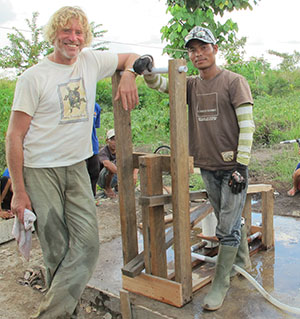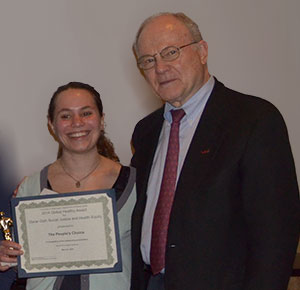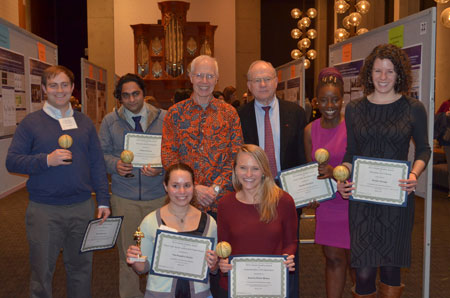Patrick Ryan is a perennial UW student. A traveler and do-gooder. A microbiologist. A benefactor. A jack-of-all-trades. "I'm good with my hands," says Ryan, holding up large, dirty fingernails.

Patrick Ryan and Musa finishing a well in Indonesia
Those hands have built and repaired homes in Seattle. They've also constructed wells and latrines across the globe, bringing clean water and sanitation to remote villages. "Global health is half my life," says Ryan. He recently spent two-and-a-half months in West Kalimantan, Indonesia, building wells with a non-profit organization called Health in Harmony. It links rural health care with efforts to save the Borneo rainforest.
When he's not volunteering overseas, or building homes and planting forests, Ryan, of Sumner, WA, often can be found attending a seminar or class sponsored by the Department of Global Health. "I'm a global health junkie," he says. Ryan first enrolled in the University of Washington in 1978 as a microbiology student but never earned a degree. He continues to take classes in subjects that interest him, earning countless credits, and he stays in touch with his old department. "I want that connection to the UW," he says.
Ryan is also one of the many donors to the School of Public Health. Although not wealthy (he drives a 16-year-old Toyota 4-Runner), he's made enough from the half-dozen homes he's owned to support his travels. The recent sale of one home allowed him to contribute $5,000 to the Department of Global Health – no strings attached.
That donation made possible the department's first Oscar Gish Social Justice and Health Equity Award – and sparked an idea for an awards ceremony to honor outstanding students. Gish, who died in 2004, was a well-known economist, author and senior lecturer in Health Services who was an expert on international health policies. "I took every class he taught," Ryan said. "He was a wonderful man."

Mariel Boyarsky, Oscar Gish Award recipient with King Holmes, Chair of Global Health
The Oscar Gish award and $500 prize went to MPH student Mariel Boyarsky for her work on maternal health problems among coffee farmers in western Uganda. She found that many pregnant women in rural Rwenzururu Kingdom didn't attend all of their recommended prenatal visits. Most gave birth at home. Boyarsky recommended that coffee cooperatives – which sell beans directly to companies rather than middlemen – adopt a community-based health insurance scheme. Women farmers wouldn't have to pay out-of-pocket medical expenses.
Buying fair-trade coffee supports the health and well-being of others far away, Boyarsky says. "I think this project really highlights the global to local connection that people in global health are starting to realize is so important. Our purchasing patterns and purchasing power can have an impact on those who grow our coffee or fruit or make our clothes." Her work was funded by Seattle's Atlas Coffee Co., which has launched a Maternal and Child Health Initiative in the Kingdom.
In addition, five "Global Healthies Awards" were given, each with a $500 prize.

Clockwise: Global Health Awardees Russel Barlow, Aditya Khanna; Prof. Stephen Gloyd, Chair King Holmes, Global Health Awardees Cynthia Simekha, Kristen Savage, Arianna Rubin Means and Oscar Gish Awardee Mariel Boyarsky
The Discovery and Development Award: Aditya Khanna, a post-doctoral fellow with the International Clinical Research Center, won for research on World Health Organization guidelines for treating pregnant women with HIV. Using computer models, Khanna and his colleagues discovered that lifelong doses of antiretroviral therapy for pregnant women were not only beneficial for women and children, but also had the potential to substantially reduce heterosexual transmission of HIV. The research was funded by the HIV Modeling Consortium and the National Institutes of Health.
Education and Training: Kristen Savage, MPH student in health services, won for a pilot project with the Ethiopian Orthodox Church to train priests as health educators. "In Ethiopia, there are 250 priests for every doctor," Savage says, "and we wanted to see if this project could help bridge that gap by empowering religious leaders to engage in conversations about health." Priests spoke to their followers about HIV transmission and the importance of prenatal care. The result? A 20 percent increase in women receiving prenatal care at the Woleka Health Center in northern Ethiopia. Savage's work was sponsored by SCOPE (Strengthening Care Opportunities through Partnership in Ethiopia), a collaboration among the Department of Global Health, University Presbyterian Church in Seattle, and the University of Gondar in Ethiopia.
Implementation and Action: Arianna Rubin Means won for her project highlighting neglected tropical diseases. They're a group of 17 chronic and disabling conditions – including schistosomiasis and leishmaniasis – affecting more than 1 billion of the world's poorest people. Means (MPH, Epi '13) is a PhD student in the Department of Global Health's new implementation science doctoral program. She is collecting data on operational research in neglected tropical disease programs across the world to identify where gaps in programmatic knowledge and implementation capabilities exist in order to guide future research. Means continues to consult on these diseases as a research analyst for the Bill & Melinda Gates Foundation.
Public Health and Direct Care: Cynthia Simekha, an undergraduate majoring in public health and minoring in global health, looked at ways to improve access to Medicaid enrollment for Somali immigrants in Columbus, OH. Some of her recommendations to improve access – such as translating materials into various ethnic languages – have already been implemented, Simekha says. She worked with Ohio State University College of Public Health, the Ohio Commission on Minority Health, the Somali Community Association of Ohio, and Our Helpers Community Center.
Lab Sciences: Russell Barlow, a PhD student in pathobiology, studied pertussis, also known as whooping cough, which has been on the rise since the 1980s despite high rates of vaccination. He and his colleagues studied the course of the illness among previously vaccinated persons in the Portland, OR, area who still succumbed to infection. "While the current vaccines may not perfectly protect people from becoming infected," Barlow said, "they still appear to protect persons from life-threatening disease and help them to recover more rapidly."
